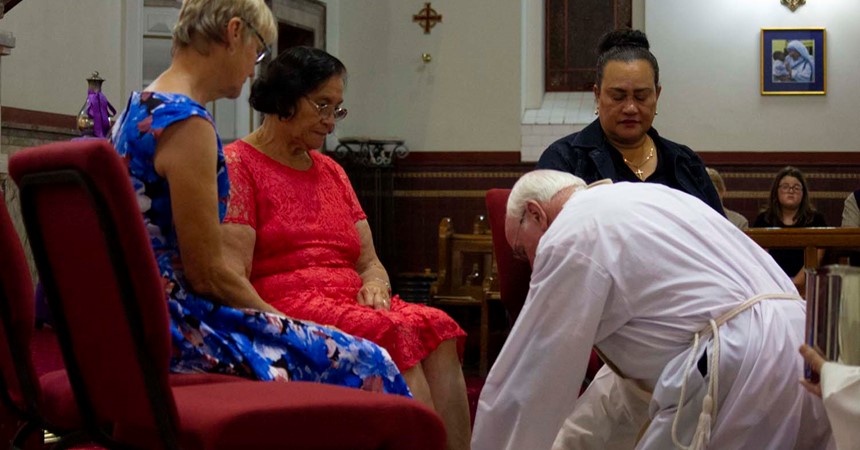In all formation we seek to help people deepen their understanding and appreciation of these principles and to grow in their capacity to work from principle to practice and vice versa. In Liturgy Matters we shall briefly explore these principles, beginning today with what I would call the central one: Every liturgy is a proclamation and celebration of the Paschal Mystery. (CSL n. 6, 26)
We all know the meaning of the term Paschal Mystery: it is the mystery of Christ, which includes his life, death, resurrection, ascension and gift of the Holy Spirit. In the Paschal Mystery, the mystery of God’s love is revealed perfectly in Jesus AND also in Jesus we see the perfect human response to God’s love.
It is one thing to know the meaning of something with your head. It is an entirely other thing to know it with your heart through experience. Only the latter ‘heart knowing’ enables and empowers us to live the paschal dying and rising rhythm in the ‘here and now’ circumstances of our lives.
The scriptures present this paschal wisdom as far removed from our human ways. At first glance, it is an upside down, inside out wisdom. It seems counter intuitive to human wisdom − unless one has faith and views the world with the eyes of God.
This brings us to the importance of liturgy as a proclamation and celebration of the Paschal Mystery. Through the action of the Holy Spirit, our remembering of Christ’s life, death and resurrection in the liturgy makes it present for us to participate in NOW. In the liturgy, we join ourselves to Christ’s dying and rising mystery so that we experience its rhythm and learn how to live it every day.
- In liturgy, we stand together as a community, equal before God so we learn that in life we stand shoulder-to-shoulder and equal with all people.
- In liturgy, we mark ourselves with the Sign of the Cross so that in life we might recognise the cross and know how to respond with the love of God.
- In liturgy, we engage in dialogue – with the presider and the scripture readings – so we learn that Christian life is lived in dialogue with God and that our starting point is always to listen and only then to respond.
- In liturgy, we are silent so that we learn the value of silence in our noisy world.
- In liturgy, we ask for and receive mercy so that we become the giving-receiving mercy of God in the world.
- In liturgy, we offer thanks and praise to God, so that we learn to live as people who naturally offer thanks and praise to others.
- In liturgy, we listen to the Word of God so that in life we will be able to recognise God’s Word amidst the many words that fill our days.
- In liturgy, we exchange the sign of peace so we know that we are to live as people of peace.
- In liturgy, we are blessed, so that we know we are to live as a blessing.
One of my favourite quotes about the Paschal Mystery is by Eamon Bredin. Alas, I have never been able to find the reference.
The resurrection event is neither reported nor described in the Scriptures. It is first and foremost a matter of faith; not an occurrence that can be observed, a reality more real than the observable. For the early Christian community the resurrection was not a dogma to be believed but a daring, decisive, power-filled call to live as Jesus lived; a distinctive way, the way of kingdom obedience.
Thus in the mystery of the resurrection we are not faced with something over and done with, something imprisoned in the past, but an intensely present reality…
The Paschal Mystery is proclaimed and celebrated in every liturgy. The Constitution on the Sacred Liturgy says that the liturgy is ‘the primary and indispensable source from which the faithful are to derive the true Christian spirit.’ (a. 14) This is true because the Paschal Mystery is the primary and indispensable source of the true Christian spirit. There is no other ‘theme’ for any liturgy. It is only through our full, active and conscious participation in the celebration of the Paschal Mystery in the liturgy that we learn to live as Christ;
- to be broken open and poured out for the life of the world;
- to stand wherever pain and suffering is most raw or unpalatable;
- to hold on to hope when everything seems hopeless;
- to be attuned to the small and precious gifts of life.
We need the liturgy’s proclamation and celebration of the Paschal Mystery to be clear, loud, strong, and uncompromising. We need to immerse ourselves in the paschal rhythm of the liturgy so we can do our best to live it every day. The world needs us to do this. We have been sent by God to do nothing less.
Those of us who engage in liturgical ministry need to ensure that we understand this principle, lest unintentionally, we get in the way of the liturgy’s proclamation and celebration of it.

